DUBAI: Millions of Turks are waiting with bated breath for the next bombshell video from fugitive organized crime boss Sedat Peker — in which he is expected to detail his ties to President Recep Tayyip Erdogan.
Peker, 49, a prominent mafia figure since the 1990s, regularly moves to avoid capture and rendition by Turkish authorities, having fled from his country last year to avoid a criminal investigation.
On May 26, the chief public prosecutor’s office in Ankara issued a new arrest warrant for Peker on suspicion of being in league with Fethullah Gulen, the US-based preacher who Turkey blames for a failed coup against Erdogan in 2016.
In a series of videos, which have reached millions of viewers on YouTube, Peker has unleashed a deluge of accusations of corruption, mismanagement and connections to organized crime within Erdogan’s ruling Justice and Development Party (AKP).
His allegations, which have rattled the political establishment, include drugs and weapons trafficking, and longtime cooperation between senior Turkish officials and Al-Nusra militants in Syria.
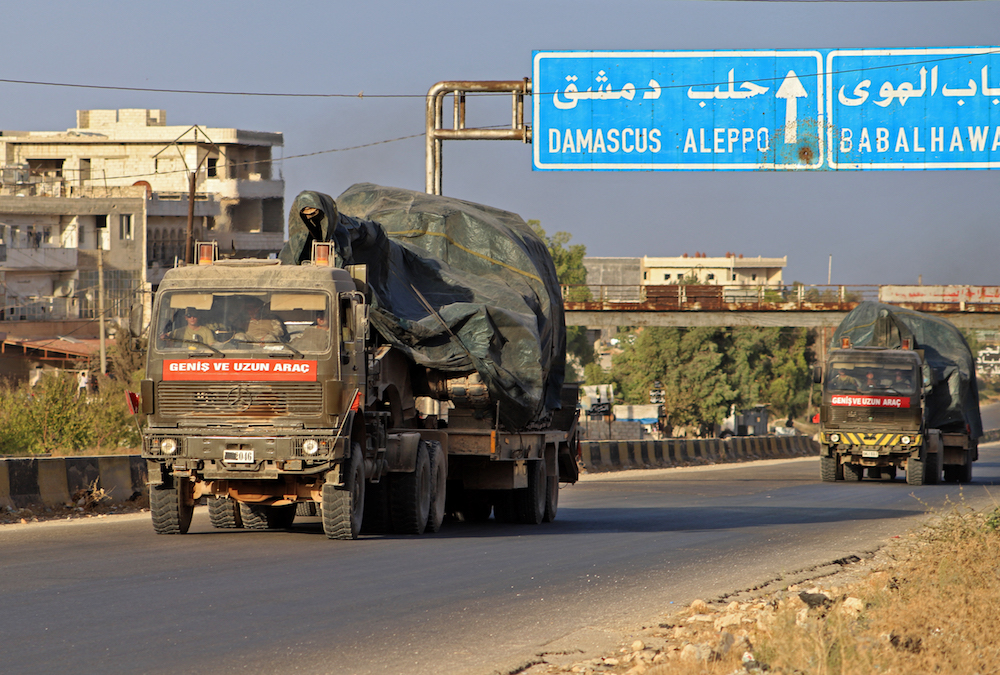
Turkish military vehicles, part of a convoy, drive through the town of Ariha in the rebel-held northwestern Idlib province on October 20, 2020, after vacating the Morek post in Hama's countryside. (AFP/File Photo)
Peker’s videos feel like “live reporting from inside the gang” and should be taken seriously, Gokcer Tahincioglu, a Turkish investigative journalist, told Reuters.
“There is a confessor who is not anonymous and who wants to speak of his own accord. Why shouldn’t he be heard? He must be heard.”
In what appears to be a concerted campaign to blacken the names of his estranged accomplices, Peker’s allegations cover corrupt practices, the absence of the rule of law, and rivalries between the security apparatus and the judiciary.
Peker says that his statements are designed to “take revenge” on the Turkish government and especially Interior Minister Suleyman Soylu, who allowed police officers to raid his home in April after he fell out with the regime.
Soylu has rejected accusations against him, which include extending Peker’s police protection after he left jail and warning him of a crackdown on his organization.
He has called the claims “disgusting lies” and a plot against the country.
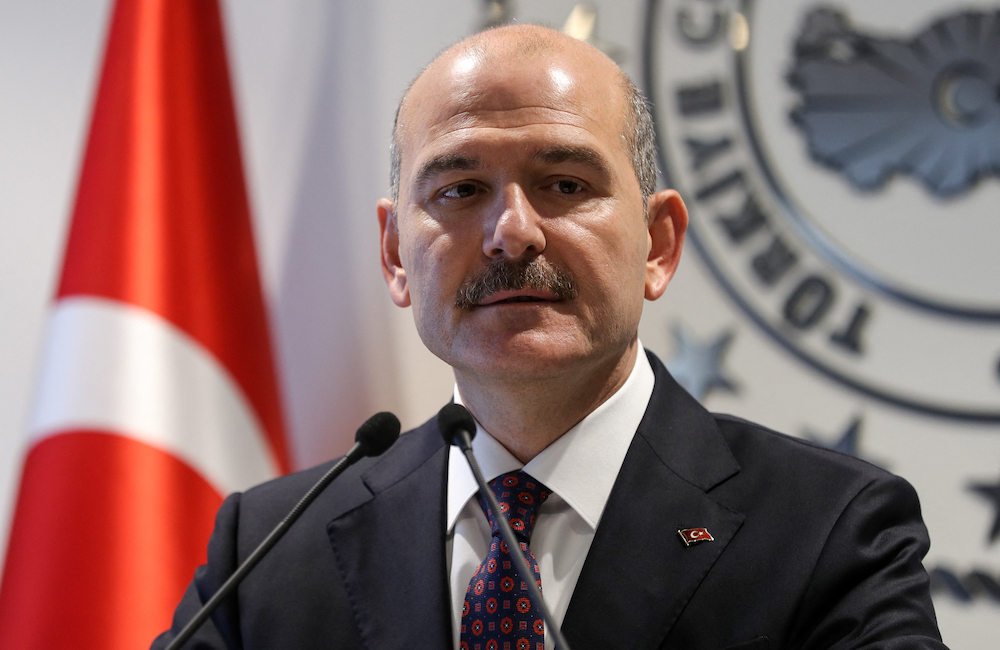
Peker said his statements are designed to “take revenge” on the Turkish government and especially Interior Minister Suleyman Soylu, pictured at a press conference in Ankara. (AFP/File Photo)
Erdogan has vigorously defended his government’s record on tackling organized crime. “We have crushed criminal organizations one by one for 19 years,” he told lawmakers on May 26, insisting he stands “side by side” with Soylu.
Peker resurfaced again on May 30 in his eighth video, this time accusing the country’s rulers of conspiring with a paramilitary force to send weapons to Al-Qaeda-linked terror groups in Syria.
Peker claimed Turkey sent weapons to Al-Nusra Front militants through a paramilitary group named SADAT, formed in 2012 by a retired general and 23 officers who were expelled from the armed forces due to their Islamist allegiances.
Al-Nusra Front, which is now called Hayat Tahrir Al-Sham (HTS), retains control of Syria’s rebel-held Idlib province, which hugs Turkey’s southern border.
In his video, Peker alleges that doing “big business” in Syria requires the permission of not only the presidential head of administrative affairs, Metin Kiratli, but also of pro-government businesspeople and a senior Al-Nusra militant, Abu Abdurrahman.
Peker also implied that the money trail could never be tracked back to the Turkish state after it was hidden by a “corrupt network” with the help of the interior minister.
The Turkish YouTube sensation
* Fugitive mafia boss Sedat Peker has been making headlines with his claims about prominent political figures in Turkey.
* His tell-all videos aim to seek revenge against those who discredited him in favor of rival mobster Alaattin Cakici.
* IMDb has listed Peker’s videos as a TV mini-series under the topics ‘biography,’ ‘crime’ and ‘reality TV.’
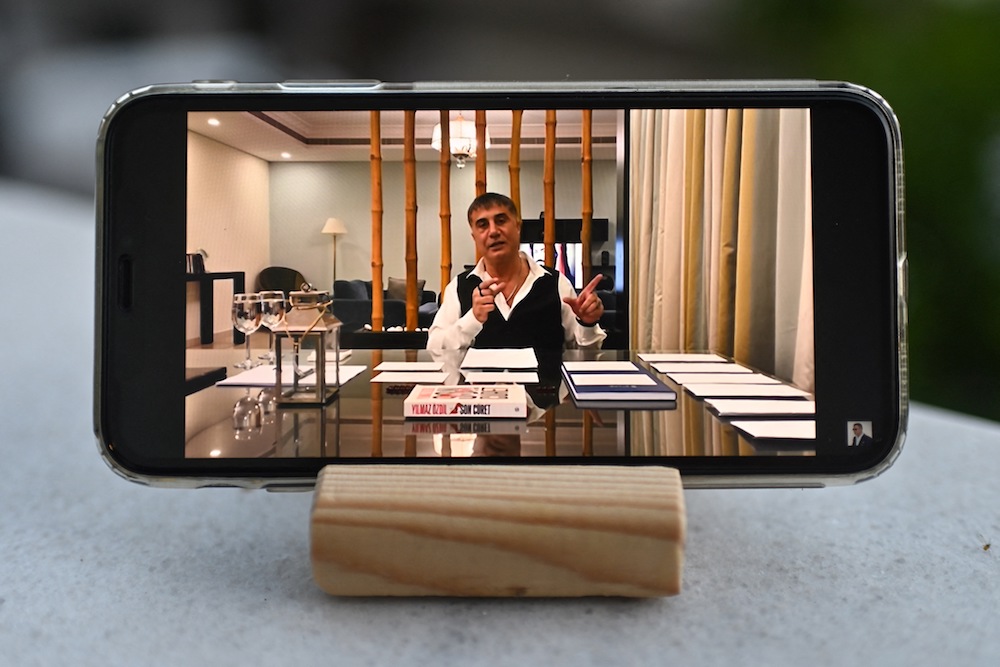
He claimed to have arranged to send military equipment to Syrian Turkmen and shared the plan with an AKP lawmaker in order to receive permission to dispatch the trucks in 2015.
He also claimed to have opposed sending aid to Al-Nusra Front because the group was fighting Turkmen minorities in Syria. He said that the trucks were diverted and sent to Al-Nusra fighters instead by a group within SADAT.
“They diverted aid trucks for Turkmen to Al-Nusra under my name, but I didn’t send them — SADAT did. I was informed about it by one of our Turkmen friends,” Peker said in the video.
The paramilitary company is closely linked to the Turkish government and allegedly played a role in recruiting and providing training to militants during the Syrian and Libyan civil wars.
Peker has been in and out of prison since 1998 on charges that include racketeering, forgery, robbery, false imprisonment, incitement to murder, and building and leading a criminal organization.
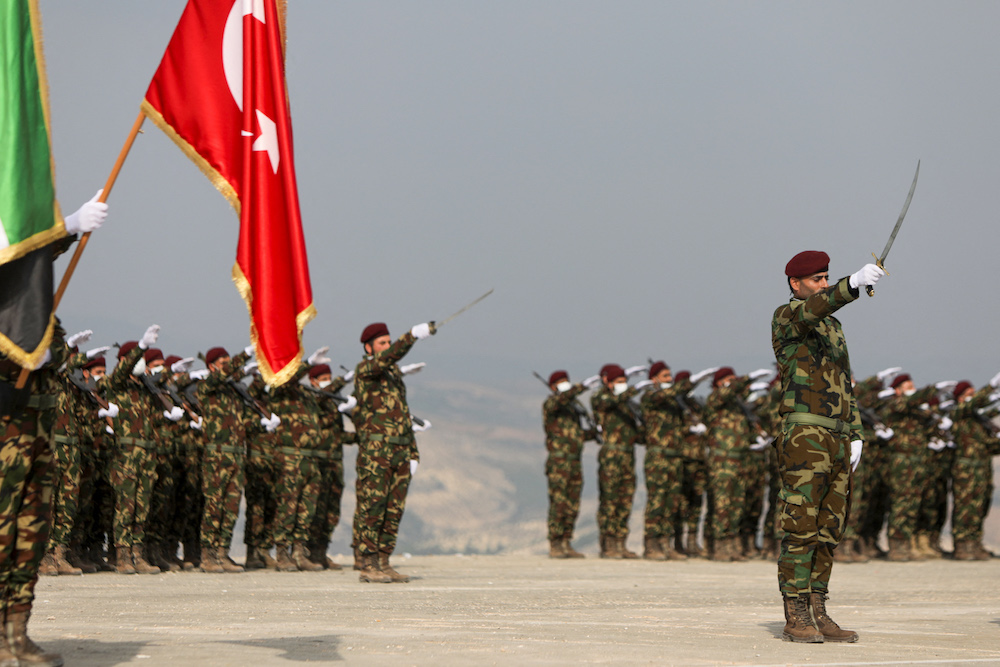
Turkish-backed Syrian rebel fighters, mask-clad due to the COVID-19 coronavirus pandemic, take part in a military parade marking the graduation of a new batch of cadets. (AFP/File Photo)
Among the politicians skewered in his videos is Binali Yildirim, another former prime minister and now deputy leader of the AKP. Peker said that Yildirim’s son Erkam had made frequent trips to Venezuela to set up a new international drug trafficking route to Turkey.
Yildirim claimed Erkam’s trips were to deliver COVID-19 aid, but his defense backfired when Turkish customs data showed that no such medical equipment left Turkey on the dates in question.
Peker’s claims have infuriated the Erdogan government.
“Peker showed that he acts under the orders of Turkey’s enemies and domestic evil alliances with his ridiculous statements,” chief presidential adviser Oktay Saral said. “Our state will do what’s needed and all powers will recognize that this country won’t be damaged with such acts of nonsense.”
Nevertheless, a new survey by the polling company Avrasya suggests that most Turks — 75 percent — believe Peker’s claims.
“Peker’s allegations are creating such a stir in Turkey because they all seem eminently plausible,” David Romano, Thomas G. Strong Professor of Middle East Politics at Missouri State University, told Arab News.
“People have long decried the role of the ‘deep state’ in Turkey. Erdogan’s AKP rose to power promising to do away with the deep state, but many think that Erdogan simply replaced one ‘deep state’ with another of his own making.
“Peker’s revelations have been providing Turks with a peek into how that new ‘deep state’ operates. Although, with today’s judiciary in Turkey being mostly quite subservient to President Erdogan, no one should hold their breath for any commissions of inquiry into these matters.”
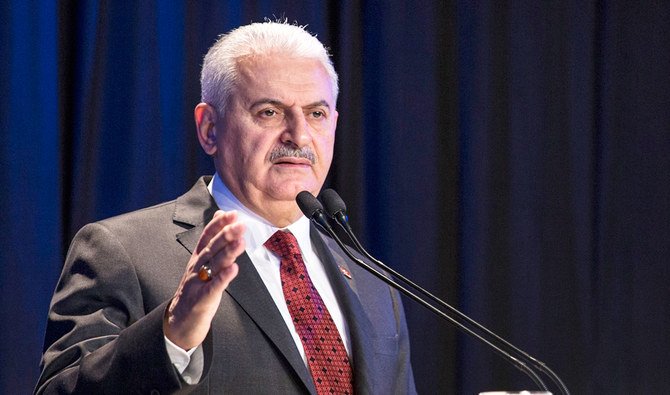
Peker claims that the son of former prime minister Binali Yildirim went to Venezuela with the intention to set up a new route for cocaine smuggling in the country. (AP/File Photo)
Peker’s accusations have triggered an in-depth look into the country’s deep-state apparatus. At the center of this scrutiny are the trials of Mehmet Agar, a former interior minister and police chief, and Korkut Eken, a former intelligence official.
Agar and Eken will be retried over 18 extrajudicial killings that occurred in the 1990s after an appeals court decided to reverse their acquittals in a ruling that was adopted on April 5. The court asserted that the evidence was not suitably examined.
Agar and Eken have made fresh headlines following allegations by Peker, who accused them of committing several unlawful acts under the state apparatus, including involvement in an international drug-smuggling scheme and the assassination of investigative journalists Ugur Mumcu and Kutlu Adali.
Journalist and peace advocate Adali was shot dead outside his home in July 1996 in the northern Cyprus administration. The murder has remained unsolved.
Adali’s spouse filed a case with the European Court of Human Rights against Turkey, and in March 2005 the court found that Ankara had not conducted a proper investigation into the murder of the Turkish Cypriot journalist.
Last week, Turkish police detained Atilla Peker, brother of Sedat, after he said that he assigned his brother to a botched mission to kill Adali 25 years ago on the orders of the state.
Mumcu was killed by a car bomb in January 1993 outside his apartment in Ankara. Peker alleged Agar had a hand in the killing.
It remains to be seen how the Turkish government will handle the fallout from the accusations, and whether Soylu, who is at the center of claims over state-mafia relations, will resign.
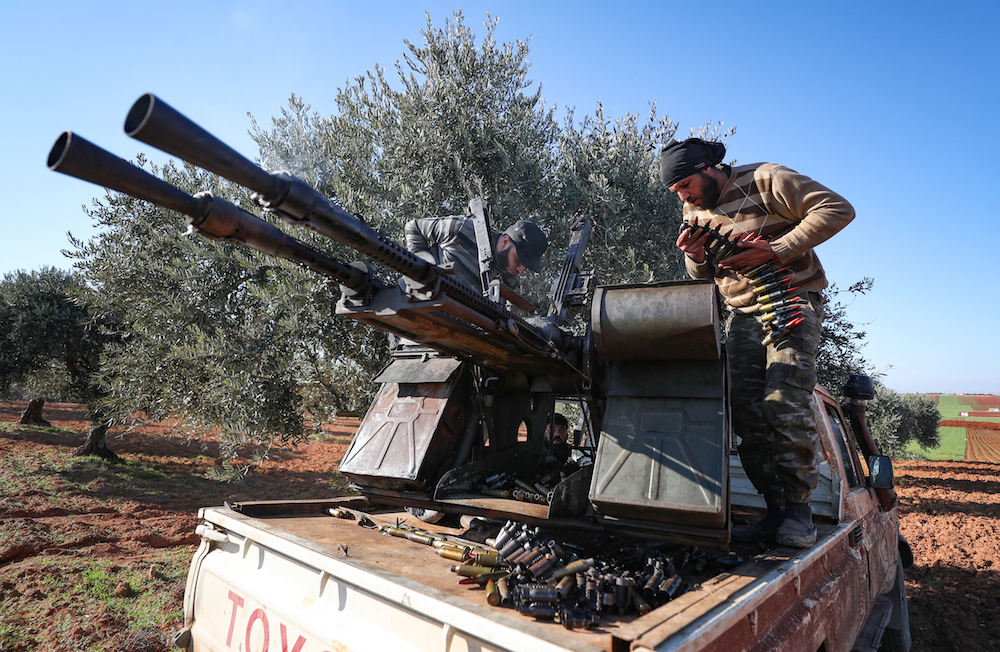
Turkey-backed Syrian fighters load their weapons at a position on outskits of the villages of Afis and Salihiyah situated near the regime-controlled town of Saraqib. (AFP/File Photo)
The first notable reaction to Peker’s disclosures came from veteran political figure Cemil Cicek, a former minister of justice and speaker of parliament.
When a few high-level members of the AKP raised their voices against corruption, he said: “If one thousandth of what Peker says turns out to be true, this is already a disaster for the country.
“Public prosecutors who hear or read such scandalous news do not need an instigation to take action. They are expected to prosecute these allegations on their own initiative without being asked or instructed to do so.”
If Peker continues blowing the whistle on his past ties with the highest echelons, it could prove a serious litmus test for the Turkish government’s popularity and its ability to act against the criminal underworld ahead of elections scheduled for 2023.
The accusations could undermine the ratings of a government that has already lost considerable public support.
As for the likely implications for voter behavior, the AKP and its far-right ally the Nationalist Movement Party have been steadily losing popular support.
“This decline is not reversible. No doubt about it,” Sinem Adar, associate at the Center for Applied Turkey Studies at the German Institute for International and Security Affairs, told Arab News. “Peker’s allegations are, in this sense, another hit to an already losing alliance.
“More than the electoral support, however, the damage reflects itself more in terms of solidifying and accentuating the already existing conflict and competition among different cliques within the ruling alliance.”



























